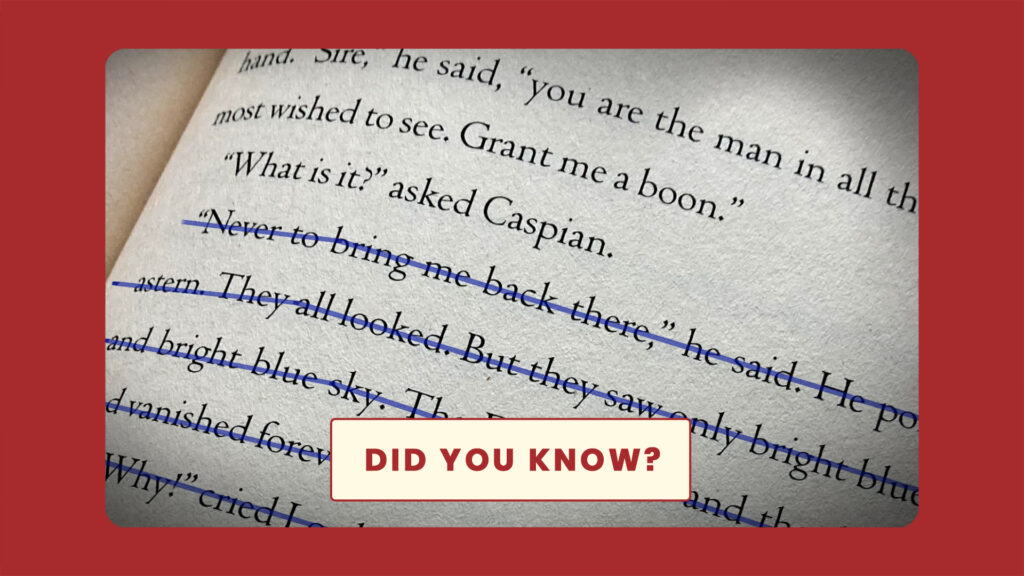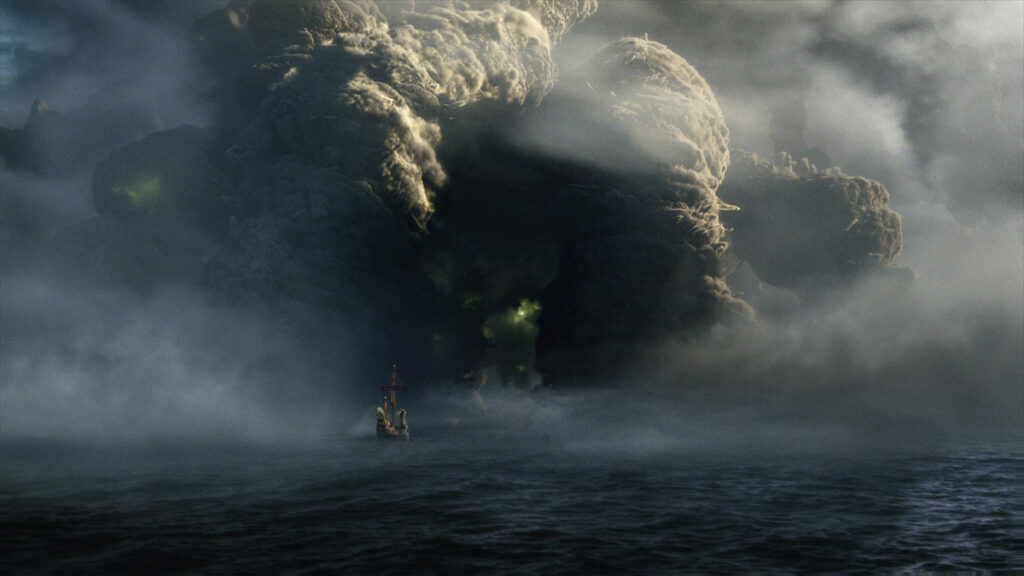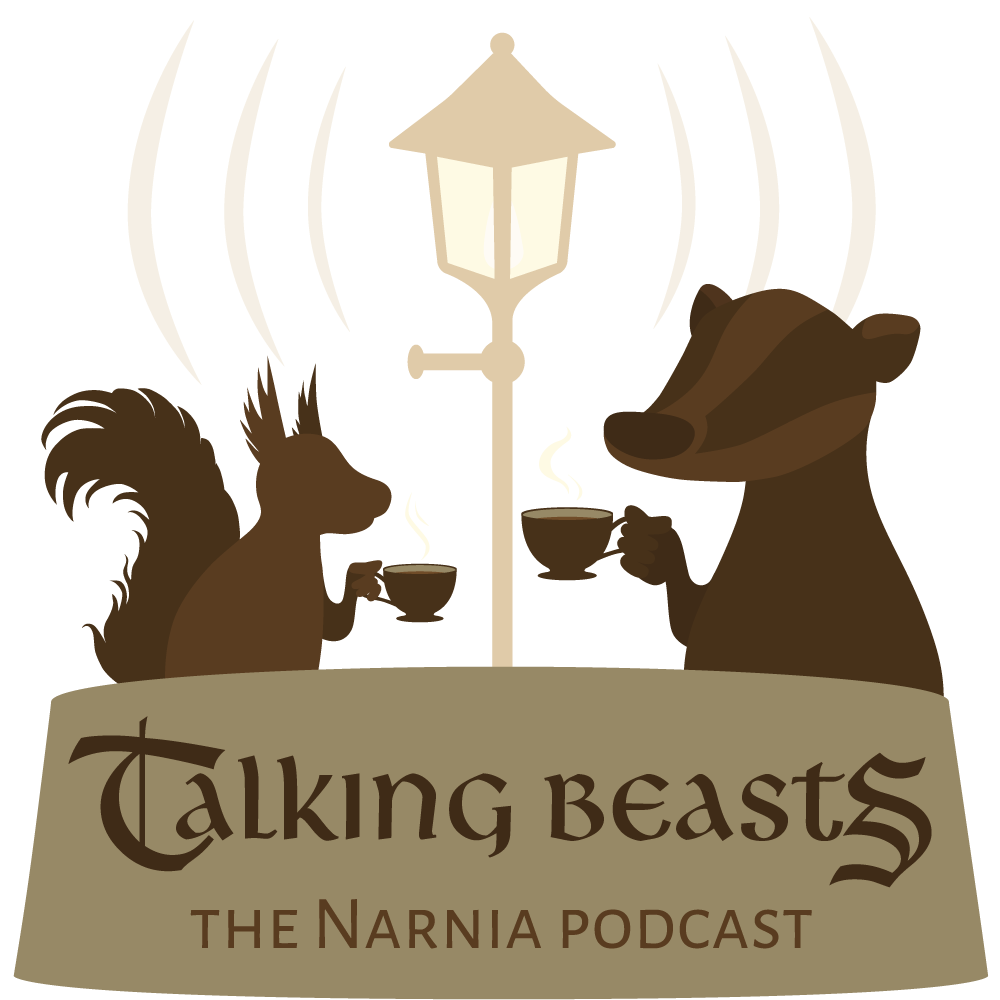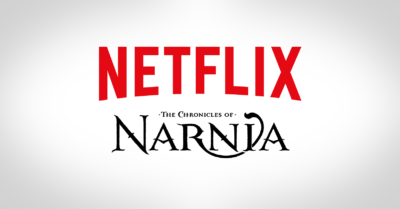C.S. Lewis Changed His Mind About This Scene in The Chronicles of Narnia

Look for “Did you know” articles on NarniaWeb on the first of every month.
Since HarperCollins took over worldwide publishing in 1994, all English language volumes of The Chronicles of Narnia have had the same text. But prior to that, American editions actually contained several revisions that C.S. Lewis had made. Although most were quite minor, there was at least one substantial change to account for something important to Lewis.
Dreams
Lewis was haunted by his childhood dreams. In Surprised by Joy, Lewis shares that one of his earliest memories was the “terror of certain dreams,” and referred to them as a “window opening on what is hardly less than Hell”. 40 years later, those memories played a role in the creation of Dark Island.
The Dark Island is a large, dark mass visited by the crew of the Dawn Treader in Lewis’s third Narnia book. It’s not really a physical piece of land but a black mist-like void in which nothing can be seen. A place where nightmares appear to become a debilitating reality.
Giant scissors shutting and creatures crawling up the ship’s side. The crew became trapped inside their own minds. A feeling that Lewis knew all too well.

But after the Dawn Treader escapes Dark Island, Lewis seems to make light of the crew’s irrational fears. In the original British text, readers are told “And all at once, everybody realized there was nothing to be afraid of and never had been”. The dark menace disappears, the crew begins to laugh and Rynelf even notes how they’d “made pretty good fools of ourselves”.
Prior to release in America, Lewis had the opportunity to re-read his work again. As a result, he wanted to address the subject of dreams with more care. Given his experience, that made perfect sense. In his revision, Rynelf’s comment is deleted and he made crucial changes to let audiences know that Dark Island really does exist.
Lewis scholar and author Paul Ford speculated on these changes.
His aim was to correct any impressions that the original British edition might have given that night fears are unreal and ultimately laughable and that they can be obliterated altogether”.
Paul Ford (Companion to Narnia)
Dark Island Re-Disappears
HarperCollins now publishes the original version without any of Lewis’s revisions. The Way Into Narnia author, Peter Schakel, has been a vocal critic of the decision.
It is regrettable that Lewis did not include these revisions – and the other changes as well – in reprints of the British Editions. It is even more regrettable that Lewis’s revisions were not used in the uniform edition of 1994; because they were not, most readers henceforth will read and know only the earlier, less effective wordings.
Peter Schakel (The Way Into Narnia)
HarperCollins has never made any public comments in regards to their reasoning. You can read the two versions side-by-side here.
Listen to our 2013 book commentary where Glumpuddle and Rillian discuss their preferred version. Do you have a preference? Post a comment below!






I know some fans, like Schakel and Glumpuddle, prefer the American ending, but I prefer the original ending. Ironically, I think the reason I like it is the reason the podcast episode gives for disliking it. That it’s out of nowhere. I was expecting the chapter to end the way the revised version does. So the Dark Island vanishing was really awe-inspiring to me. I will admit though that the description of waking up from a bad dream in the American edition is more powerful than in the original one.
It was an interesting twist of fate that led to me reading the English ending before the American one. The copy of the book in my library was an old revised copy, but when I first read the beginning, the story didn’t seem that appealing. (Please don’t hate me. I was scared it was going to have a lot of nautical terms in it.) I didn’t read the whole thing until I was hooked on Narnia and by then I had a copy that had the original text. Maybe if I had read the American version first, I’d prefer that.
If C.S. Lewis was really worried about belittling the trauma of childhood nightmares, I don’t see why he couldn’t have just taken out Rynelf’s line about the characters “making pretty good fools of themselves.” But as a writer myself, I respect his right to revise his own work. My right as a reader is to prefer the original. To understand how I feel, Glumpuddle and Rilian can just imagine the revised American edition as being my version of the Star Wars Special Editions. 😉
I feel as if the revisions show how different people grapple with the end result of a nightmare, either with apprehension of the next one, or with a way to take power over it. There is some consequence of the terror of the dream after waking up, and I appreciate that Lewis put the thought into that after-state.
Professor Schakel would certainly know what kind of ending is best. I guess the author, C. S. Lewis, is at liberty to change different editions of his own work. And yes, Dr. Schakel was my professor at Hope College so I knew him quite well during my education there in the 1970’s. By all means take a C.S. Lewis course if you can. You won’t regret it. 🙂
I prefer what I have always read (in the UK versions) and the explanation that the US version took childhood nightmares seriously doesn’t change my mind. At this point in the story, the characters realise not that nightmares are untrue, but that they have no power over them, that Aslan was more powerful (even if only Lucy actually knew it, calling on Aslan’s name for help was what made the difference).
I dislike some of the American changes. Fenris Ulf is not an improvement over Maugrim. But I’m very much in support of the revised Dark Island ending. My issue with the British version is the statement that “Dark Island and the darkness had vanished forever.” If this had really been the last book in the series as Lewis originally was planning and all of the characters ended up in Aslan’s country, this would be a beautiful picture. But it rings untrue in light of the rest of the series. Caspian in the Silver Chair deeply desired to find his stolen son, that was likely the darkest moment in his life, but Aslan allowed it to persist for a time. I don’t believe it’s fair to suggest darkness will vanish when you ask it to; the persistence of it in this life is inevitable and cannot truly be “destroyed” until our life on earth ends.
I also don’t understand Lord Rhoop’s request, “Never to bring me back there.” Does he truly believe Caspian would do such a cruel thing? No, I much prefer his request not to be reminded of the terrors he had to endure.
You’re assuming that the Dark Island is supposed to represent the darkness of life in general. I don’t see any specific evidence of that in either version of the book.
That is so cool you studied under Dr. Schakel!
I can’t disagree with his decision (he is C.S. Lewis, after all). Fear isn’t always all just in our heads, and it can take some awfully strong magic to dispel it.
What overcomes the peril for the voyagers in this scene is that they are following Aslan out of the darkness. They have something to hang onto, whereas without Aslan, the island would not only be dangerous but almost certainly fatal for them, and they would likely be trapped there like Rhoop.
Yes, I may be assuming too much. However, nightmares are products of stress and difficulties going on in our real lives. They are linked. Also, notice that Lewis made Dark Island a more tangible place in the revision.
Banishment of nightmares (“You have destroyed it.”) implies we are also somehow impervious to life’s trials. That’s unconvincing.
I liked reading the article and the comments.
Just letting you know that the link to read both versions doesn’t work. It takes me to the Wikipedia page at the resources section but I can’t figure out which resource to click.
I would love to read the American editions one day! Both the 1974 version I read first and my 21st century hardbacks use the British text. Which I love, but it would be interesting to read the alternate version.
Like some others here, I prefer the British edition’s ending, but I can see the merits in both. The British version was certainly the one I read first (the British editions have always been the ones sold in Australia), but on top of that, Aslan making the darkness disappear completely is more consistent with my own understanding of God. And I never saw that episode as suggesting that the adventurers would never encounter any darkness or fear ever again! But different readers will have different opinions on this, and that’s how it should be.
I actually find it debatable whether Lewis’s alterations to the American editions were changes that he wanted to stand for all time. Most of them (I have Peter Schakel’s book in which he goes over them in detail) aren’t improvements at all — they either don’t affect the story substantially, or in at least one case just sound completely silly. (That is, Aslan’s roar in LWW being changed to “Wow!”) The VDT revision is the only one that makes a noticeable difference. But if Lewis HAD wanted that revision, or any of them, to be definitive, why didn’t he tell his British publishers and make sure ALL future editions had the revised text — which he didn’t? It’s one of those questions we can’t really answer.
I’m always intrigued by the fact that, when the first paperback editions (by Puffin Books) were being planned, Lewis spoke to the editor, Kaye Webb, and mentioned that he’d like to make some revisions to the Chronicles to clear up some inconsistencies that he was aware of. Unfortunately, that conversation was only a couple of days before he died. So we’ll never know what those revisions would have been and whether the ending of the Dark Island chapter would have been one of them!!
I much prefer the revised version, but not for Lewis’s reasons. I actually relate to something feeling really scary in the moment, but later you look back and realize there was never anything to be afraid of. That’s called growing up. Learning to walk is difficult – even scary – but eventually it becomes easy.
The island being destroyed (British) feels really random to me. Just kinda thrown in. Whereas, Rhoop telling Caspian he never wants to be asked what he has seen (revised version)… I find that really powerful.
I prefer the UK versions too, mostly because it’s what I’ve always known (my copies were Harper Collins) but also, I just personally don’t like authors revising already published work. If it’s non-fiction and important, new information is available, then I get it. But for fiction, I prefer it to be kept as close to the original as possible because I think the book reflects the author’s personal views at the time of writing, almost like a diary entry or recorded letters. The author might look back and cringe a little, but if a revised version replaces the original, we don’t get to see the author’s progression of ideas and beliefs
“The island being destroyed (British) feels really random to me.” That’s what I love about it. 😉 It’s so unexpected.
“Whereas, Rhoop telling Caspian he never wants to be asked what he has seen (revised version)… I find that really powerful.” I don’t want to sound like I’m bashing the American edition. Both are really well written. But I don’t get what fans of Lewis’s revisions seem to see in this line. It’s not badly written or anything but it’s not that great. I mean…well, duh, Rhoop wouldn’t want to talk about it! I feel like readers get that from both editions.
I was so happy to have taken that C. S. Lewis course decades ago. Now Dr. Schakel is retired, and perhaps he is still active in teaching C. S. Lewis. Some Hope College students have told me that the course is still offered by the college. Another professor is teaching it. I’m glad that the interest in Lewis is still there. 🙂
If you scroll up the Wiki page has them posted side by side
Thanks, Jonathan! I just updated the link 🙂
I wonder who at the publisher got to decide on the British vs American version… or the Publication vs Chronological decision.
I do find it interesting that the movie version borrows the idea of Dark Island disappearing from the British edition.
Eventually, I think I actually would naturally ask Rhoop what has happened to him the past few years (or however long he has been on the island). Seems unlikely that would not come up in conversation at some point.
I don’t really get why you say “borrowed” since the British edition is the “official” version now. Pretty much every copy, whatever country in which it’s published, uses that text. It’d have been more surprising if the movie had been like the American edition.
It’s been very interesting reading this comments section, because I’ve never actually read the American edition. My family chanced upon the British, and now “canon” version completely by accident and it’s all I’ve ever known. So I’m learning about some of these alternate takes for the first time.
I also don’t really feel like I can take a side, but it’s still interesting to read about!